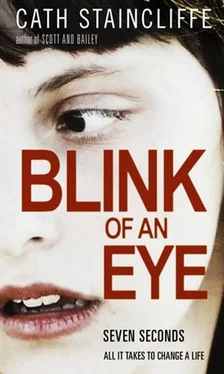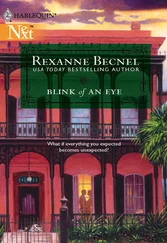Up ahead we could see several vehicles – police cars and vans – and a prefab, a mobile investigation unit. On the steps that led up to it, a young police officer was smoking a cigarette, a large polystyrene coffee cup in her other hand. Beyond that were people in protective suits, their heads covered, working. And a white structure in the middle of the road. A square tent. I knew it must be where the girl had died.
Phil parked and we got out. Only as we crossed to the river side did I see the car. A blackened, mottled heap, resting on its roof, the front end partly on the narrow grass verge, the rear crushed, mangled with the railings that edged the riverbank. The trees immediately above were stripped of foliage, their branches burnt and black, blasted like something in a war zone.
‘Jesus,’ Phil said under his breath.
From where we stood, the stink of molten plastic, the charry smell of burning caught in the back of my throat. Crumbs of glass, fragments of metal and a layer of white powder covered the ground, and curls of grey ash riffled in the breeze, echoing the shivers of the police tape. Larger pieces of debris were scattered all over the road and beside them bright yellow markers, like mini sandwich boards, each numbered.
There were birds singing too, oblivious, a song thrush in the canopy of the trees further along, its sweet, trilling melody clear in the relative quiet of the day.
‘She wasn’t burnt,’ said Phil.
‘No, they must have got out before.’
I turned and looked across at the school and the pedestrian crossing beyond. The playground was deserted. Were they in lessons; would they be kept in, as though it were raining, because of the tragedy? It struck me that perhaps the girl went to the school. That her friends and teachers would be in mourning for her today. Maybe school was cancelled.
‘Oh, Phil.’ He put his hand on my shoulder, squeezed it. I thought of the parents, of the dark place they must be trapped in. Of their anguish. Imagining what it would be like if one of my girls was dead, if one of mine had been killed as a child. Never grown up.
‘See the gatepost?’ He nodded to the school gates, where one of the stone posts listed to the side. There were lots of markers close to it, and labels on the post itself as well as the railings further down next to the yellow sign: Show You Care – Park Elsewhere.
‘They must have hit the post,’ he said.
Or the child did? I didn’t say it aloud.
A plane flew low overhead, the roar something to be endured. I watched its shadow ripple over the school roof and then the road, darkening the little white tent before moving on over the trees that fringed the river. In its wake a quiet fell before the song thrush resumed its serenade, one of the CSI people called to another at the far end of the stretch and a hornet whined close to my ear, perhaps mistaking my earring for a flower.
Looking again at the car, I noticed the dark pools on the ground around it. Blood? There had been blood in Naomi’s nose; had she spilled more on the road? Or had Alex? Monica never mentioned that he had any wounds like that. When I pointed it out to Phil, he thought it was probably something else, molten plastic or burning fuel. ‘It’s melted the road surface, see? You can see the difference.’
The heat. My stomach swooped as I imagined that heat, what might have happened if they hadn’t got out.
‘She wouldn’t have stood a chance,’ Phil said, his voice old with sorrow. Momentarily I thought he was imagining the fire, and then realized he was looking at the white tent. The glow of guilt licked my cheeks.
One of the CSI people picked something up and placed it in a bag, then wrote on it.
‘She might not have used the crossing. Thought she’d risk it,’ I said.
‘You think she was crossing the road?’ When I didn’t reply, he touched me. ‘Carmel?’
‘Because that makes more sense.’ I tried not to sound defensive, but all my muscles were stiff, there was a tension across the back of my skull and down my neck, and I had to force the words out. ‘There wouldn’t have been time to stop, to swerve. Naomi’s not a bad driver.’
‘You heard Suzanne, she’d been drinking.’
‘It was an accident,’ I said, as if that was some sort of excuse. I was unwilling to face the facts head on, even though they were laid out for me in the charred metal chassis by the trees, in the markers that littered the tarmac, and the bright white canopy concealing the site where the girl had lain. It was all too new, too raw, and I wanted to twist it into a different pattern, to bend it and weld it until it was something less dangerous, more palatable.
Phil had no such compunction. ‘If she’d been drinking and then drove that car and that child is dead…’ There was steel in his voice, and disgust, disgust for his own daughter. So unlike Phil. My vision blurred and I blinked to clear it.
That child . My mind veered away whenever it came close, like a wild animal smelling smoke, instinctive, protective. It hurt to think of her, of her and her nine years and her family.
Above the trees a flock of starlings came wheeling and turning in formation, then settled in the branches. Their high piping cries overlapped, fast and insistent, like a mob running rumours, trading gossip. The sun was hot on my scalp and my shoulders but I was chilled to the core.
‘We might lose her, Phil.’ I turned to him, my back to the police tape and everything beyond it.
His mouth tightened and his brow creased and he gave a fierce nod.
‘We have to just…’ I broke off, uncertain what I meant to say. I tested the notion: Naomi dead, her injuries too great. Please, no. Pleasepleaseplease .
Had she cheated fate? Had she been marked to die in the crash but escaped? Was fate now stalking her, drawing inexorably closer? You can run but you can’t hide. I knew I was trying to articulate that we had to stand by her and believe that she would come through, support her.
‘Whatever it takes, you know that,’ Phil said. Pain harrowed his features, and he pushed his hands either side of his temples and raised his face to the sky above and groaned.
The hornet returned, droning by my face, and I waved it away.
The woman who had been on the steps of the Portakabin was walking our way. She smiled as she reached us. ‘Hello, can I help?’
I shook my head, tried to smile but failed.
‘No,’ said Phil.
‘You live locally? Did you see anything yesterday evening?’
‘No, sorry,’ said Phil. ‘Just passing.’
We didn’t want to say it; neither of us could bring ourselves to own up. It was my daughter. See the car. Her fault. Let Suzanne be wrong, please, I thought. If Naomi had been drunk, then whatever the child had done, even if she had been in the middle of the road doing handstands on her handlebars, the fact that Naomi had got into what amounted to a lethal weapon with a bottle of wine sloshing through her bloodstream meant she was the guilty one. So we did not introduce ourselves to the police officer, but turned and slunk away. I could feel the shame rippling through me, wide as a river, deep as the sea.
It was surreal, travelling home along the tree-lined roads, past the shopfronts with their pavement displays. And it was peculiar finding the house as we had left it. Almost as if I expected the very bricks and mortar, furniture and fittings to be loosened or altered by the accident. Sleep eluded me, I went through the motions – a quick shower – then lay in bed with the curtains closed. Tried to empty my mind, listened to Phil snoring, imagining the noises he made were really waves breaking on a vast tropical shore, that I was lying on the hot sand, my muscles softening in the heat. But however much I tried to relax, the images of Naomi still and silent in a hospital bed, the blackened car and the stark white tent swam to the fore. And questions, persistent as the starlings’ chatter had been: why had Alex let her drive? Why didn’t they get a taxi or stay at Suzanne’s? Where had the child been? Could Naomi have avoided her if she had been sober? Was she sober? I prayed that Naomi would be conscious when we went back, out of danger and able to explain it all to us.
Читать дальше












